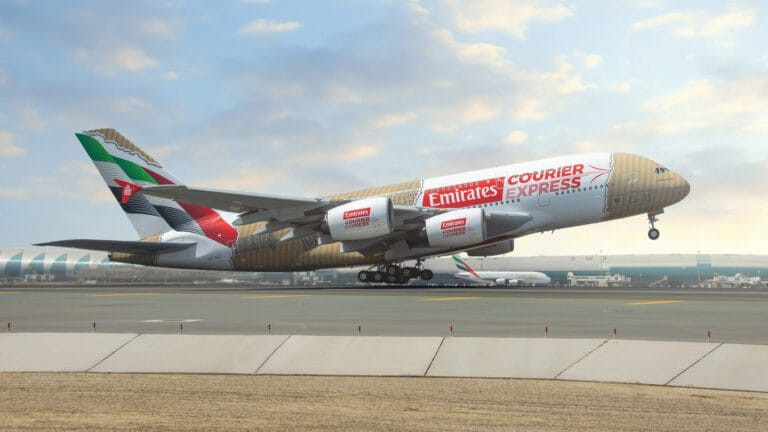Emirates SkyCargo is upending the traditional airfreight paradigm by embracing a fast, flexible, and customer-centric model that challenges legacy thinking with its new Courier Express product—a point-to-point solution designed for speed, transparency, and agility.
“One of the key things for the Courier Express product is listening to our customers and really understanding the needs that they have,” said Dennis Lister, senior vice president of product and innovation at Emirates SkyCargo. “And one of the big things that has come up time and again has been about speed, efficiency, reliability, track and trace. These have been the fundamental things that are required.”
Underscoring that Emirates is uniquely positioned to deliver on these promises by leveraging its extensive passenger fleet—which now functions as a global logistics backbone—Lister said: “Looking at our passenger fleet, it’s probably one of the best fleets in the world that connects anywhere point to point in under 48 hours. That’s super important, because you can now be in a position to get packages delivered around the world very quickly.”
This model bypasses the constraints of the hub-and-spoke systems favoured by traditional cargo carriers, enabling Emirates to inject new speed into global supply chains. “That’s one of the biggest USPs for this product—the fact that we have a huge passenger fleet that enables us to connect to the key cities around the world,” he explained. “It gives us the speed, gives us the capacity to basically find these packages anywhere in the world.”
With aircraft such as the A380 now doubling as global express logistics assets, Lister added: “We now have
The e-commerce moment
Emirates SkyCargo’s express strategy isn’t simply about infrastructure—it’s about matching a rising tide of digital demand with equally responsive delivery.
“We see more and more customers, consumers wanting speed and reliability,” Lister explained. “So when you order something online, people now have access to phones. They can connect anywhere in the world, connect to any retailers in the world. And guess what? They don’t want to wait seven days or 14 days.”
This new mindset among shoppers is exactly what Emirates is designed to support. “We can deliver in two days to anywhere in the world on our network that has been set up,” Lister said with conviction.
Initially launched in seven markets, including the UK, Middle East, and South Africa, the strategy is focused but ambitious. “The approach we’ve taken is to start reasonably in the markets that are close to Dubai,” he noted. “That’s kind of set us up very well to get this product off the ground.”
But the rollout won’t stop there. “Beyond that, we want to go into the next big core CEP, core express parcel markets—Australia, India, China, US. So the forecast looking forward is bold, and we plan to be everywhere on the Emirates network in the long term,” Lister stated. “In the next two to three years, definitely we’re going to knock out the key markets.”
In the Courier Express model, speed is not only a logistical advantage—it’s a brand differentiator. With two clearly defined products—Emirates First (first flight out) and a premium 48-hour express offering—Emirates can serve a diverse range of urgent and semi-urgent delivery needs. “We have the speed, we’ve got the agility, and we have the ability to use partners at the final destination to get it delivered very quickly to our customers,” Lister said.
Partnerships and regulatory agility
When it comes to customs compliance and last-mile delivery, Emirates SkyCargo sees value in collaboration.
“We’ve set up our partners in the network,” Lister explained. “A key thing is around compliance, customs. So the partners we have selected are best in class in those local markets. They are the experts.”
This approach allows Emirates to remain nimble, focused on its core strength—speedy, global delivery—while leaning on regional expertise for final-mile execution. “What we’re not looking to do is build our own capability of customs clearance and final-mile distribution,” Lister emphasised. “There are enough partners out there that do a very good job in that.”
By acting as a logistics integrator rather than a vertically integrated monopoly, Emirates not only accelerates its rollout into new markets but ensures localised expertise is built into every step. “We believe this is a partner network that we’re creating, and that enables us to be compliant and be customs compliant as well.”
Furthermore, the model enables Emirates to serve densely populated urban centres directly. “If you look at a lot of the traditional courier entities, they are operating on quite a rigid network, where they use a freighter network to deliver packages to the key hubs,” Lister outlined. “The difference with us is we’re using our passenger fleet to where people are, where people travel—and those are the real important cities where you want to get packages and parcels delivered to.”
By aligning logistics with passenger traffic, Emirates’ model bypasses the added transfer layers common to freighter-centric networks. “That enables a lot more speed and agility and the ability to be flexible in delivering stuff very quickly to customers,” he added.
Digital first
At the core of Emirates’ Courier Express product lies a clear principle: digitise everything. In an industry still burdened by paper air waybills and legacy systems, Emirates is pushing into the future with a digital-first ethos that rewrites the cargo playbook.
“The first thing that we had in the white paper with delivering this product was to have a digital-first approach,” Lister highlighted. “Number one, we don’t want any documentation to flow with these products.”
That ambition has been fully realised. “You will see everything we produce, apart from the label itself that’s stuck on the box at the retail of the customer, it moves through APIs,” he explained. “We do not produce a single bit of paperwork in the entire journey.”
This not only streamlines operations but empowers the end-user with real-time transparency. “Everything is driven through API, everything is digital for the customer,” Lister noted.





